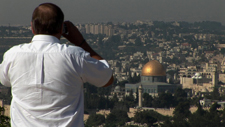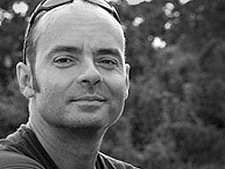Talking with the co-director of JEWISHFILM.2009's opening night film

"Waiting for Armageddon"
JEWISHFILM.2009, the annual film festival organized by The National Center for Jewish Film, will take place at Brandeis and The Institute of Contemporary Art in Boston from March 25 through April 5. BrandeisNOW talked with the festival’s curator, Lisa Rivo, and, in a separate conversation, with Franco Sacchi, co-director of the festival’s opening night film, “Waiting for Armageddon.” Sacchi’s documentary explores the growing influence of Christian Evangelicals on American foreign policy in the Middle East. For more information on Sacchi and “Waiting for Armageddon,” read the Boston Globe feature on the documentary. For more information on JEWISHFILM.2009, read the festival press release.
For the complete schedule and tickets, visit www.jewishfilm.org or call 781-736-8600.
BrandeisNOW: What about JEWISHFILM.2009 excites you most?
Lisa Rivo: What’s nice about this year’s line-up is the diversity of the material. The breadth of the material covers five or six different countries and we found after we had programmed the festival that certain themes came to the fore. One of those is American icons, and I’m thinking particularly of the Will Eisner film and the film about Fred Leebo, “Run for Your Life,” which somewhat bookend the festival. Both of these icons happen to be Jewish and the biographical details of their lives very much inform the unusual and extraordinary undertakings, one with regard to art and illustration in comics and the other with sports and sports promotion. The other thing that came to the fore were the three feature films from Isreael: “Lost Island,” “Seven Days,” and “Father’s Footsteps.” All of them feature Israeli families, and the wars that were taking place when those films were set impact the narrative. This is not unusual for Israeli films, but it was interesting to find that the three feature films sort of bring us through the last three decades and war’s impact on these families.
BrandeisNOW: How did you find the films for this year’s festival?
LR: As with any exhibitor, we try and go to as many festivals as we can. I read everything about the International festivals and work with the distributors and with the international fests to see what they’re playing. And we whittle the films down to that which we feel represents the best artistic work and we’re also very careful in the materials that we show to make sure that they’re historically accurate; we often vet the documentary material through scholars, most of them at Brandeis. We also try to balance films from different countries, on different themes– you know, we wouldn’t want to have 10 Holocaust films. We’re also particularly excited if a filmmaker is available and can come. And the festival has always been an opportunity to work with our partners, and friends and colleagues on campus, and we try to include as many folks as possible, both in terms of discussions or utilizing faculty as moderators. We also want films that would appeal to the wide range of materials that are being taught on campus. All of this is particularly interesting for us because the film festival grows out of the work of our Center, and it’s just one part of what we do. The National Center for Jewish Films is the largest archive of Jewish film outside of the state of Israel and we are the largest distributor of Jewish film.
BrandeisNOW: You said that you like to have filmmakers come to campus. I know that Franco Sacchi, the co-director of “Waiting for Armageddon” will be here. Tell me why you selected this film.
LR: I saw “Waiting for Armageddon” when it had its world premiere at Lincoln Center, at the New York Jewish Film Festival. We immediately were impressed by the topic. Once we saw the film, we were really impressed by the treatment of the subject. As a controversial subject and as a complex and multifaceted subject, we felt that the filmmakers really treated the material with respect. And when we found out that Franco and two of the producers were Bostonians, we were further encouraged to show the film because we do like, as often as possible, to highlight local filmmakers.
Franco Sacchi is co-director of “Waiting for Armageddon.”
 BrandeisNOW: How did you feel about being selected for inclusion in JEWISHFILM.2009?
BrandeisNOW: How did you feel about being selected for inclusion in JEWISHFILM.2009?
FS: Even though I’m not Jewish, I think this is a very important film for the Jewish community because this is really a film that deals with the relationship between Christian fundamentalism evangelicals and Israel. It’s such a critical part of the world – Israel, it’s a country that is under so much pressure and it’s relevant not only for Jewish people, but for the rest of the world. Understanding this very important relationship, it’s important. So I think it’s very pertinent and I really think it makes sense that a Jewish Film Festival investigates such an important story.
BrandeisNOW: You will be on campus to talk with audience members after the screening. Are you looking forward to that?
FS: Very much so! One of the main motivations of the film was to start a dialogue. We never intended to make a polemic, or a film that attacked anybody. We made a film in the hope that many debates like this will happen around the country. And the film can be a catalyst for that. Last week, we were in Columbus, Ohio at the Jewish film festival there, and a representative of a Christian evangelical fundamentalist church was present on the panel. That person had a very important role in the conversation.
BrandeisNOW: How did you come to the topic of the film?
FS: I have the point-of-view of the foreigner that was observing the state, but the idea for this film happened in 2005. I was noticing there was an enormous amount of stories about the influence of the evangelical movement on the culture, but it seemed to me the dots were not connected. It was really, really important to connect the dots. I felt this movie had to be done or even more had to be written about it. But since I make movies, I decided to start a documentary and then we formed a group to make the film after.
BrandeisNOW: Anything you’d like to add about the film or JEWISHFILM.2009?
FS: I think certainly it’s a great honor and I’m really thankful to the festival for giving us an opportunity to show the film.





